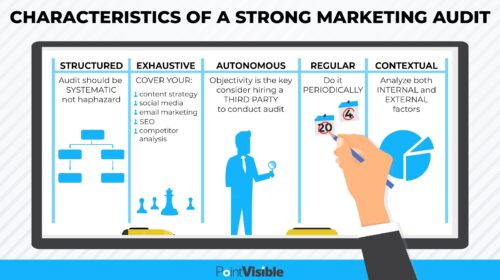In today’s fast-changing digital landscape, conducting a digital marketing audit is not just an option—it’s essential for unlocking growth and staying ahead of the competition.
Too often, businesses invest significant time, effort, and money into marketing tactics without taking a step back to evaluate what’s working. A digital marketing audit offers a 360-degree view of your current digital presence, empowering decision-makers to align strategies with real performance data.
What Is a Digital Marketing Audit?
A digital marketing audit is a systematic examination of your brand’s online footprint. It reveals how your digital channels—such as SEO, social media, email campaigns, paid advertising, and website performance—are performing and how well they support your business objectives.
In other words, it’s the foundation for data-driven marketing decisions.
SEE ALSO: Top 10 AI Business Tools to Watch Out for in 2025
Why a Digital Marketing Audit Matters More Than Ever
A digital audit isn’t just a nice-to-have. It’s the first step toward:
- Eliminating wasteful spending
- Refocusing on high-performing channels
- Aligning marketing with your KPIs
- Making smarter decisions backed by data
If you want to stay competitive, regular auditing ensures your marketing stays aligned with shifting customer behaviour and business goals.
Key Benefits of a Digital Audit
As marketers, we’re constantly under pressure to deliver growth. A digital audit helps you pinpoint exactly where that growth is coming from—or where it’s being blocked.
Key benefits include:
- Spotting performance gaps in your current strategy
- Identifying your strongest and weakest channels
- Maximizing ROI by investing in what works
- Aligning efforts across teams and platforms
- Improving user engagement and conversions
With clear, actionable data, your marketing becomes more targeted and more effective.
When Should You Conduct a Digital Marketing Audit?
A digital audit isn’t something you should wait to do until performance drops. Instead, it should be a scheduled part of your marketing calendar.
When to consider an audit:
- At the start of every quarter or fiscal year
- After launching a major campaign
- When working with a new client
- After revising business goals or KPIs
There’s no one-size-fits-all timeline—but consistency is key.
Signs You Need a Digital Marketing Audit
Not sure if it’s time? These indicators should raise a red flag:
- Poor Results from Ongoing Campaigns Your traffic, conversions, or sales are declining—or not growing at all.
- Disjointed Strategy Across Channels Your efforts on SEO, social, paid media, and email feel scattered or disconnected.
- Stagnant or Irrelevant Content Your messaging isn’t resonating, or your content hasn’t been updated in months.
These are all signals that it’s time for a comprehensive review.
How to Perform a Digital Marketing Audit

Each marketing channel plays a unique role in your overall strategy. Here’s what a full audit should cover:
1. Website Audit
- Speed, mobile responsiveness, and UX design
- Conversion paths and user journey
2. SEO Audit
- Keyword rankings, on-page and off-page SEO
- Technical SEO and backlink health
3. GEO (Generative Engine Optimization) Audit
- Optimize content for AI-driven search platforms like ChatGPT, Google SGE, and Perplexity
4. Content Audit
- Analyze content quality, consistency, and engagement
- Remove or update underperforming content
5. Social Media Audit
- Engagement rates, follower growth, and brand consistency
- Platform-specific performance
6. Influencer Marketing Audit
- ROI from partnerships, authenticity, and reach
7. Paid Media Audit
- Google Ads, Meta Ads, and other platforms
- CTR, CPC, CPA, and conversion tracking
8. Reputation Audit
- Online reviews, brand mentions, sentiment analysis
9. Email Marketing Audit
- Open rates, click-through rates, and audience segmentation
10. Analytics & Tracking Audit
- Google Analytics setup, goal tracking, and data accuracy
Each section helps you gather the insights needed to refine your digital strategy.
Final Thoughts
A digital marketing audit is not a luxury—it’s a necessity. Whether you’re managing a growing startup or an established enterprise, an audit helps you turn data into action and strategy into measurable success.
It’s not about finding faults; it’s about uncovering opportunities.
So if you’re serious about elevating your brand’s digital performance, now is the time to schedule that audit. Your future campaigns will thank you.
Frequently Asked Questions (FAQs)
Q.What is the future of digital marketing in 2025?
A. By 2025, digital marketing is expected to be even more personalized and data-driven. Businesses will rely heavily on AI tools, automation, and real-time analytics to better understand their audience and create smarter campaigns. With privacy laws evolving, marketers will also need to balance personalization with trust and transparency.
Q. What is the purpose of a digital marketing audit?
A. A digital marketing audit helps you step back and see the full picture of your online presence. It’s designed to assess what’s working, what needs improvement, and where you might be wasting time or money. Think of it as a health check for your marketing — helping you realign your strategy with your goals.
Q. Is digital marketing worth learning in 2025?
A. Definitely. As more businesses shift online, digital marketing skills are becoming more valuable than ever. Whether you’re looking to grow your brand or start a career in the field, learning digital marketing in 2025 gives you a competitive edge in a fast-growing industry.
Q. What is the future of digital marketing in the next 5 years?
A. In the next five years, digital marketing will continue evolving with trends like voice search, AI-driven content, interactive campaigns, and privacy-first strategies. Brands that stay agile and focus on building real connections with their audience will stand out and succeed in the long run.















